
بِسْمِ ٱللَّٰهِ ٱلرَّحْمَٰنِ ٱلرَّحِيمِ
بِسْمِ ٱللَّٰهِ ٱلرَّحْمَٰنِ ٱلرَّحِيمِ
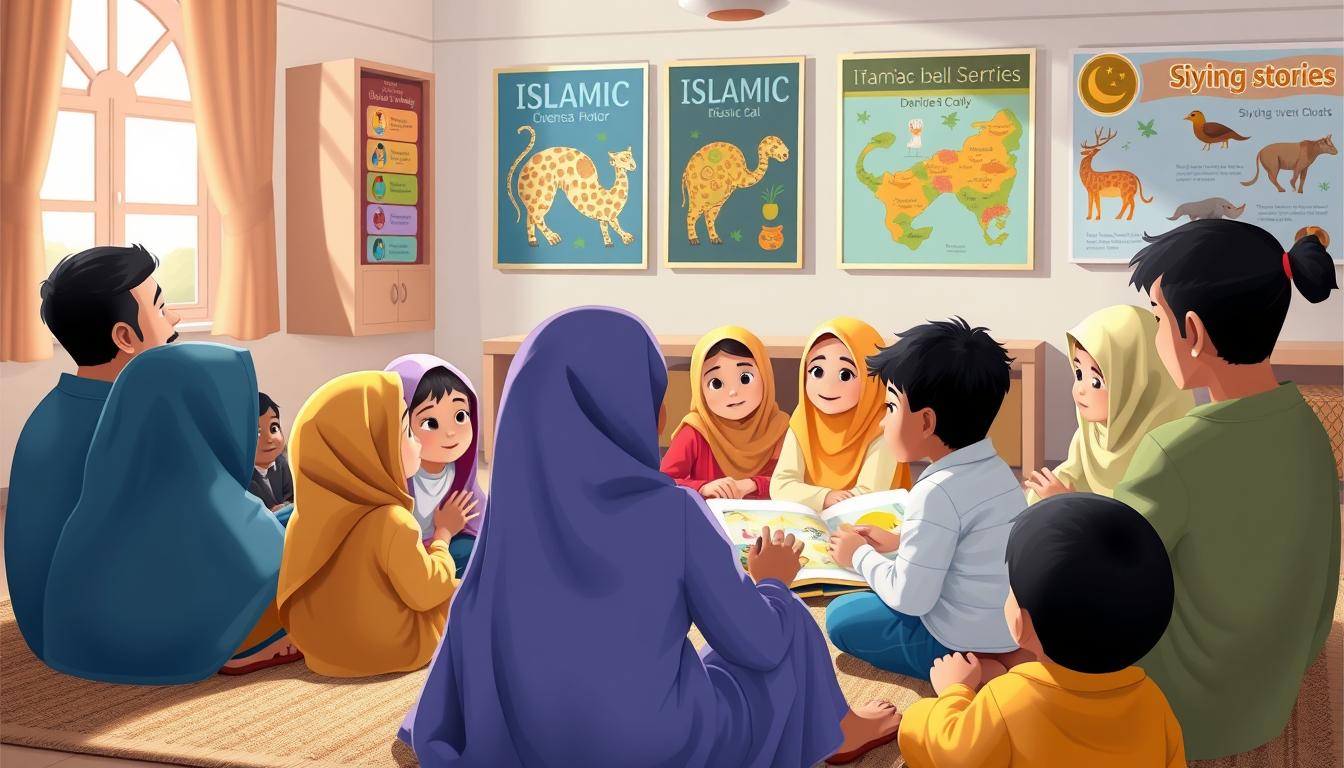
Hadith stories offer a beautiful window into the life and teachings of Prophet Muhammad ﷺ, providing timeless wisdom that resonates with children of all ages. These authentic narrations capture the Prophet’s interactions, guidance, and compassion, making Islamic values accessible and engaging for young minds.
Islamic Hadith stories for children
In this collection, we’ve gathered ten age-appropriate Hadith stories that teach fundamental moral lessons about kindness, honesty, respect, and more. Each story includes the original Arabic text, English translation, and interactive elements to help children connect with and apply these valuable teachings in their daily lives.
Hadith are the recorded sayings, actions, and silent approvals of Prophet Muhammad ﷺ. They serve as the second most important source of guidance in Islam after the Holy Quran. For children, Hadith stories provide practical examples of how to implement Islamic teachings in everyday situations.
These narrations are particularly valuable for young learners because they:
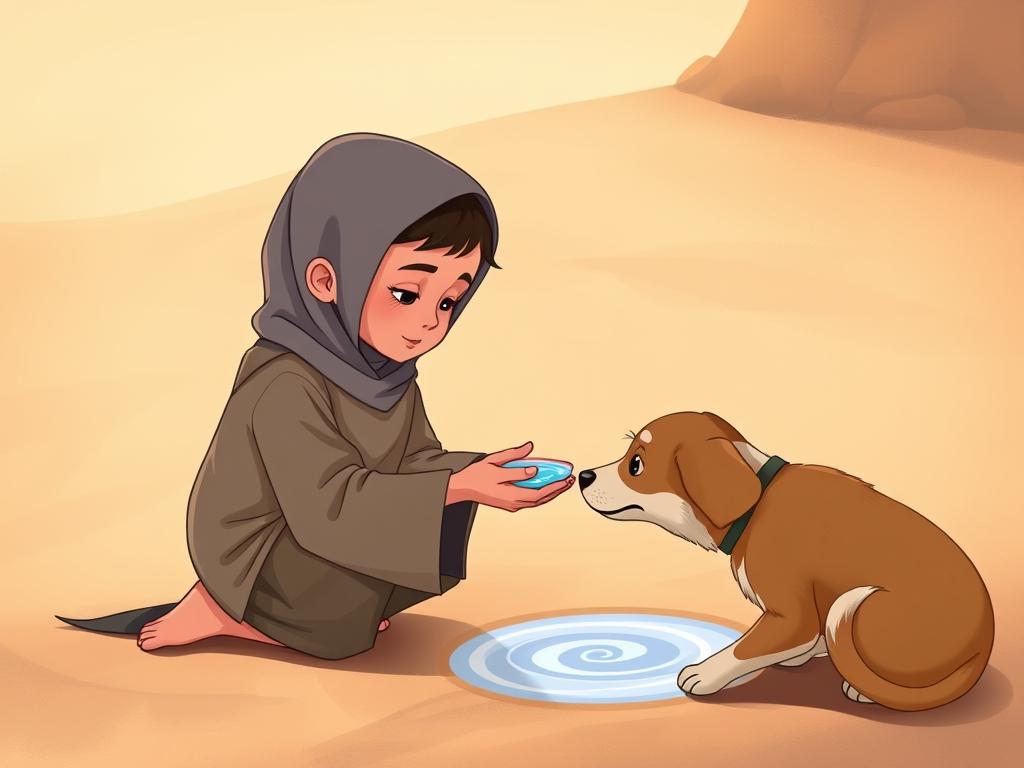
Prophet Muhammad ﷺ often emphasized the importance of showing kindness to all of Allah’s creatures, including animals. In this Hadith, he shares the story of a person who was forgiven for a simple act of compassion toward a thirsty dog.
عَنْ أَبِي هُرَيْرَةَ رَضِيَ اللَّهُ عَنْهُ أَنَّ رَسُولَ اللَّهِ صَلَّى اللَّهُ عَلَيْهِ وَسَلَّمَ قَالَ: بَيْنَمَا رَجُلٌ يَمْشِي بِطَرِيقٍ اشْتَدَّ عَلَيْهِ الْعَطَشُ فَوَجَدَ بِئْرًا فَنَزَلَ فِيهَا فَشَرِبَ ثُمَّ خَرَجَ فَإِذَا كَلْبٌ يَلْهَثُ يَأْكُلُ الثَّرَى مِنَ الْعَطَشِ فَقَالَ الرَّجُلُ: لَقَدْ بَلَغَ هَذَا الْكَلْبَ مِنَ الْعَطَشِ مِثْلُ الَّذِي كَانَ بَلَغَ مِنِّي فَنَزَلَ الْبِئْرَ فَمَلَأَ خُفَّهُ ثُمَّ أَمْسَكَهُ بِفِيهِ حَتَّى رَقِيَ فَسَقَى الْكَلْبَ فَشَكَرَ اللَّهُ لَهُ فَغَفَرَ لَهُ
‘An Abi Hurairata radiya Allahu ‘anhu anna Rasula Allahi salla Allahu ‘alayhi wasallama qala: Baynama rajulun yamshi bitariqin ishtadda ‘alayhi al-‘atashu fawajada bi’ran fanazala fiha fashariba thumma kharaja fa’itha kalbun yalhath ya’kulu ath-thara min al-‘atashi faqala ar-rajul: Laqad balagha hatha al-kalba min al-‘atashi mithlu allathi kana balagha minni fanazala al-bi’ra famala’a khuffahu thumma amsakahu bifeehi hatta raqiya fasaqa al-kalba fashakara Allahu lahu faghafara lahu.
Abu Huraira reported that the Messenger of Allah ﷺ said: “While a man was walking on a road, he became very thirsty. He found a well, climbed down into it, drank water, and then came out. He saw a dog panting and eating moist earth due to severe thirst. The man said, ‘This dog is suffering from thirst just as I was.’ So he went back down into the well, filled his shoe with water, held it in his mouth as he climbed up, and gave the water to the dog. Allah appreciated this deed, so He forgave him.”
This Hadith teaches children the importance of showing kindness and compassion to all living creatures. It demonstrates that even small acts of kindness toward animals are valued by Allah and can lead to great rewards, including forgiveness of sins. The story encourages children to be mindful of the needs of animals and to treat them with care and respect.

Prophet Muhammad ﷺ placed great emphasis on honesty and truthfulness. In this Hadith, he explains how honesty leads to righteousness and ultimately to Paradise, while lying leads to evil and ultimately to Hellfire.
عَنْ عَبْدِ اللَّهِ بْنِ مَسْعُودٍ رَضِيَ اللَّهُ عَنْهُ قَالَ: قَالَ رَسُولُ اللَّهِ صَلَّى اللَّهُ عَلَيْهِ وَسَلَّمَ: عَلَيْكُمْ بِالصِّدْقِ فَإِنَّ الصِّدْقَ يَهْدِي إِلَى الْبِرِّ وَإِنَّ الْبِرَّ يَهْدِي إِلَى الْجَنَّةِ وَمَا يَزَالُ الرَّجُلُ يَصْدُقُ وَيَتَحَرَّى الصِّدْقَ حَتَّى يُكْتَبَ عِنْدَ اللَّهِ صِدِّيقًا وَإِيَّاكُمْ وَالْكَذِبَ فَإِنَّ الْكَذِبَ يَهْدِي إِلَى الْفُجُورِ وَإِنَّ الْفُجُورَ يَهْدِي إِلَى النَّارِ وَمَا يَزَالُ الرَّجُلُ يَكْذِبُ وَيَتَحَرَّى الْكَذِبَ حَتَّى يُكْتَبَ عِنْدَ اللَّهِ كَذَّابًا
‘An ‘Abdillahi bni Mas’udin radiya Allahu ‘anhu qala: Qala Rasulu Allahi salla Allahu ‘alayhi wasallama: ‘Alaykum bis-sidqi fa’inna as-sidqa yahdi ‘ila al-birri wa’inna al-birra yahdi ‘ila al-jannati wama yazalu ar-rajulu yasduqu wayataharraa as-sidqa hatta yuktaba ‘inda Allahi siddiqan wa’iyyakum wal-kathiba fa’inna al-kathiba yahdi ‘ila al-fujuri wa’inna al-fujura yahdi ‘ila an-nari wama yazalu ar-rajulu yakthib wayataharraa al-kathiba hatta yuktaba ‘inda Allahi kaththaban.
Abdullah ibn Mas’ud reported that the Messenger of Allah ﷺ said: “You must be truthful, for truthfulness leads to righteousness and righteousness leads to Paradise. A man continues to tell the truth and strives to be truthful until he is recorded with Allah as a truthful person. Beware of lying, for lying leads to wickedness and wickedness leads to the Fire. A man continues to tell lies and strives to lie until he is recorded with Allah as a liar.”
This Hadith teaches children the importance of honesty and truthfulness in all aspects of life. It shows that being honest is not just about avoiding lies but actively striving to be truthful in all situations. The story illustrates how our habits shape our character over time, and how consistently choosing honesty leads to righteousness and Allah’s pleasure.

Prophet Muhammad ﷺ was known for his excellent character and manners. In this Hadith, he emphasizes the importance of spreading peace through the Islamic greeting and treating others with kindness.
عَنْ عَبْدِ اللَّهِ بْنِ عَمْرٍو رَضِيَ اللَّهُ عَنْهُمَا أَنَّ رَجُلًا سَأَلَ النَّبِيَّ صَلَّى اللَّهُ عَلَيْهِ وَسَلَّمَ: أَيُّ الْإِسْلَامِ خَيْرٌ؟ قَالَ: تُطْعِمُ الطَّعَامَ وَتَقْرَأُ السَّلَامَ عَلَى مَنْ عَرَفْتَ وَمَنْ لَمْ تَعْرِفْ
‘An ‘Abdillahi bni ‘Amrin radiya Allahu ‘anhuma anna rajulan sa’ala an-Nabiyya salla Allahu ‘alayhi wasallama: Ayyu al-Islami khayr? Qala: Tut’imu at-ta’ama wataqra’u as-salama ‘ala man ‘arafta waman lam ta’rif.
Abdullah ibn Amr reported that a man asked the Prophet ﷺ, “Which aspect of Islam is best?” He replied, “To feed others and to greet with peace (Salam) those whom you know and those whom you do not know.”
This Hadith teaches children the importance of good manners, particularly generosity and greeting others with peace. It shows that being kind to everyone, whether we know them or not, is a fundamental aspect of being a good Muslim. The story encourages children to spread peace and kindness through their words and actions.
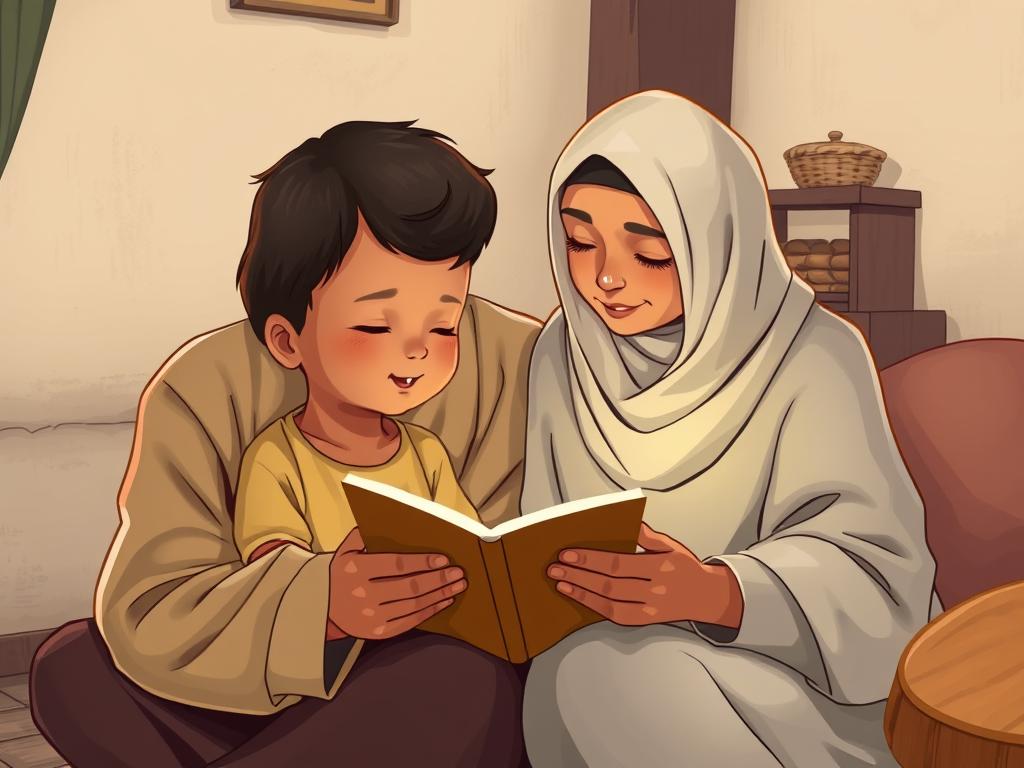
Prophet Muhammad ﷺ himself was an orphan, so he had special compassion for orphaned children. In this Hadith, he explains the great reward for those who care for orphans.
عَنْ سَهْلِ بْنِ سَعْدٍ رَضِيَ اللَّهُ عَنْهُ قَالَ: قَالَ رَسُولُ اللَّهِ صَلَّى اللَّهُ عَلَيْهِ وَسَلَّمَ: أَنَا وَكَافِلُ الْيَتِيمِ فِي الْجَنَّةِ هَكَذَا وَأَشَارَ بِالسَّبَّابَةِ وَالْوُسْطَى وَفَرَّجَ بَيْنَهُمَا شَيْئًا
‘An Sahli bni Sa’din radiya Allahu ‘anhu qala: Qala Rasulu Allahi salla Allahu ‘alayhi wasallama: Ana wakafilu al-yatimi fi al-jannati hakatha wa’ashara bis-sabbabati wal-wusta wafarraja baynahuma shay’an.
Sahl ibn Sa’d reported that the Messenger of Allah ﷺ said: “I and the one who cares for an orphan will be in Paradise like this,” and he gestured with his index and middle fingers, holding them slightly apart.
This Hadith teaches children the importance of caring for those who have lost their parents. It shows that helping orphans is so beloved to Allah that those who do so will be close to the Prophet ﷺ in Paradise. The story encourages compassion, empathy, and taking responsibility for vulnerable members of society.
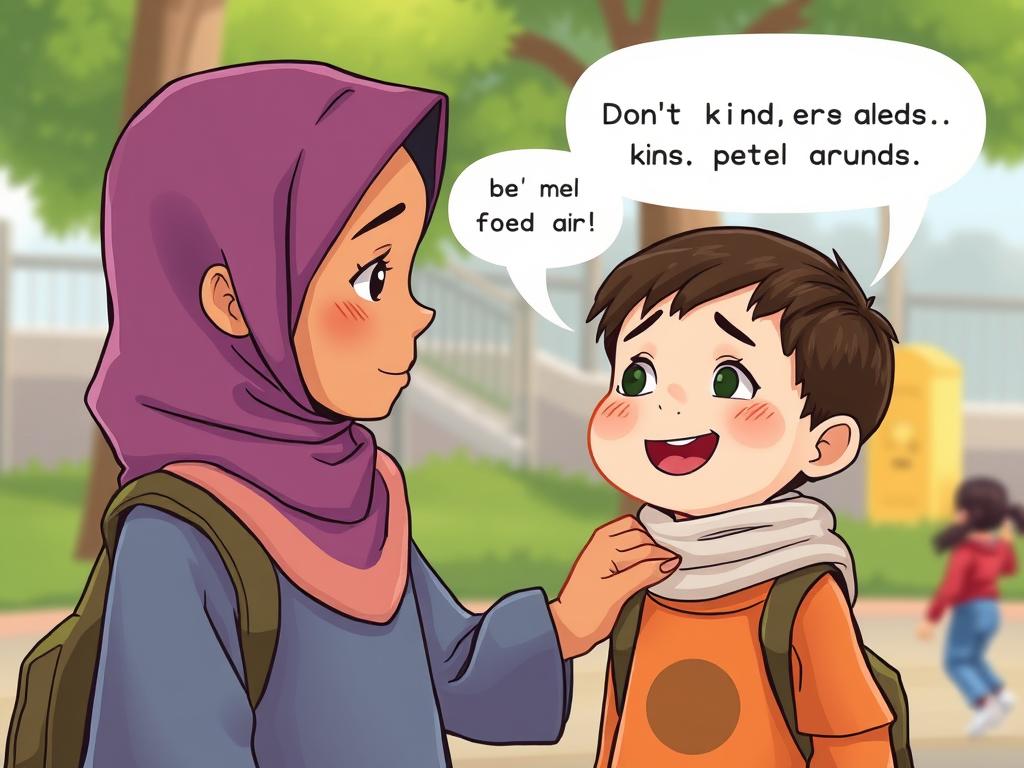
Prophet Muhammad ﷺ taught that even small acts of kindness, including saying good words to others, are valuable forms of charity. This Hadith emphasizes the power of kind speech.
عَنْ أَبِي هُرَيْرَةَ رَضِيَ اللَّهُ عَنْهُ قَالَ: قَالَ رَسُولُ اللَّهِ صَلَّى اللَّهُ عَلَيْهِ وَسَلَّمَ: الْكَلِمَةُ الطَّيِّبَةُ صَدَقَةٌ
‘An Abi Hurairata radiya Allahu ‘anhu qala: Qala Rasulu Allahi salla Allahu ‘alayhi wasallama: Al-kalimatu at-tayyibatu sadaqatun.
Abu Huraira reported that the Messenger of Allah ﷺ said: “A good word is charity.”
This Hadith teaches children that speaking kindly to others is a form of charity that brings rewards from Allah. It shows that we don’t need money or material things to be charitable – our words can make a positive difference in someone’s day. The story encourages children to be mindful of how they speak to others and to use their words to spread kindness and positivity.
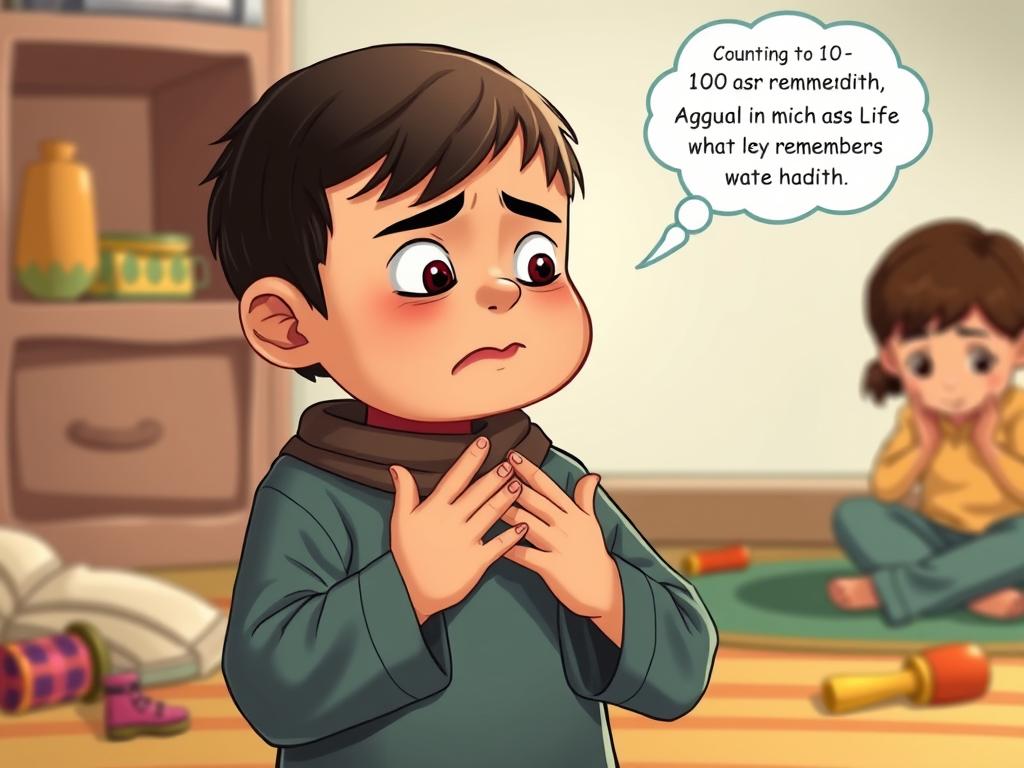
Prophet Muhammad ﷺ taught that true strength lies not in physical power but in the ability to control one’s anger. This Hadith emphasizes the virtue of self-control.
عَنْ أَبِي هُرَيْرَةَ رَضِيَ اللَّهُ عَنْهُ أَنَّ رَسُولَ اللَّهِ صَلَّى اللَّهُ عَلَيْهِ وَسَلَّمَ قَالَ: لَيْسَ الشَّدِيدُ بِالصُّرَعَةِ إِنَّمَا الشَّدِيدُ الَّذِي يَمْلِكُ نَفْسَهُ عِنْدَ الْغَضَبِ
‘An Abi Hurairata radiya Allahu ‘anhu anna Rasula Allahi salla Allahu ‘alayhi wasallama qala: Laysa ash-shadidu bis-sura’ati innama ash-shadidu allathi yamliku nafsahu ‘inda al-ghadabi.
Abu Huraira reported that the Messenger of Allah ﷺ said: “The strong person is not the one who overcomes people in wrestling; rather, the strong person is the one who controls himself when angry.”
This Hadith teaches children that true strength comes from self-control, particularly when facing difficult emotions like anger. It shows that managing our reactions and not letting anger control our behavior is a sign of real strength and maturity. The story encourages children to develop emotional intelligence and practice patience when feeling upset.
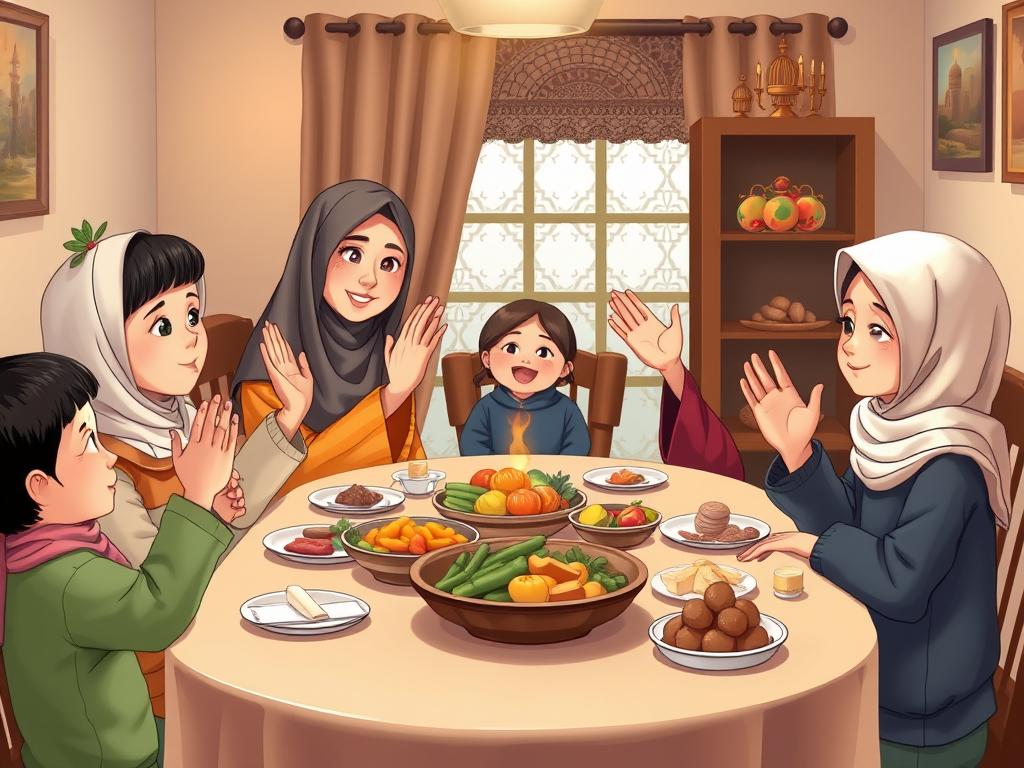
Prophet Muhammad ﷺ taught the importance of being grateful to Allah for all blessings, big and small. This Hadith emphasizes the virtue of gratitude in all circumstances.
عَنْ صُهَيْبٍ رَضِيَ اللَّهُ عَنْهُ قَالَ: قَالَ رَسُولُ اللَّهِ صَلَّى اللَّهُ عَلَيْهِ وَسَلَّمَ: عَجَبًا لِأَمْرِ الْمُؤْمِنِ إِنَّ أَمْرَهُ كُلَّهُ خَيْرٌ وَلَيْسَ ذَاكَ لِأَحَدٍ إِلَّا لِلْمُؤْمِنِ إِنْ أَصَابَتْهُ سَرَّاءُ شَكَرَ فَكَانَ خَيْرًا لَهُ وَإِنْ أَصَابَتْهُ ضَرَّاءُ صَبَرَ فَكَانَ خَيْرًا لَهُ
‘An Suhaybin radiya Allahu ‘anhu qala: Qala Rasulu Allahi salla Allahu ‘alayhi wasallama: ‘Ajaban li’amri al-mu’mini inna amrahu kullahu khayrun walaysa dhaka li’ahadin illa lil-mu’mini in asabathu sarra’u shakara fakana khayran lahu wa’in asabathu darra’u sabara fakana khayran lahu.
Suhaib reported that the Messenger of Allah ﷺ said: “How wonderful is the affair of the believer, for his affairs are all good, and this applies to no one but the believer. If something good happens to him, he is thankful and that is good for him. If something bad happens to him, he bears it with patience and that is good for him.”
This Hadith teaches children the importance of gratitude and patience in all circumstances. It shows that a believer finds good in every situation – expressing thankfulness for blessings and practicing patience during challenges. The story encourages children to develop a positive outlook on life and to trust in Allah’s wisdom in all situations.

Prophet Muhammad ﷺ emphasized the importance of helping others and relieving their difficulties. This Hadith highlights how Allah helps those who help others.
عَنْ أَبِي هُرَيْرَةَ رَضِيَ اللَّهُ عَنْهُ عَنِ النَّبِيِّ صَلَّى اللَّهُ عَلَيْهِ وَسَلَّمَ قَالَ: مَنْ نَفَّسَ عَنْ مُؤْمِنٍ كُرْبَةً مِنْ كُرَبِ الدُّنْيَا نَفَّسَ اللَّهُ عَنْهُ كُرْبَةً مِنْ كُرَبِ يَوْمِ الْقِيَامَةِ وَمَنْ يَسَّرَ عَلَى مُعْسِرٍ يَسَّرَ اللَّهُ عَلَيْهِ فِي الدُّنْيَا وَالْآخِرَةِ وَمَنْ سَتَرَ مُسْلِمًا سَتَرَهُ اللَّهُ فِي الدُّنْيَا وَالْآخِرَةِ وَاللَّهُ فِي عَوْنِ الْعَبْدِ مَا كَانَ الْعَبْدُ فِي عَوْنِ أَخِيهِ
‘An Abi Hurairata radiya Allahu ‘anhu ‘ani an-Nabiyyi salla Allahu ‘alayhi wasallama qala: Man naffasa ‘an mu’minin kurbatan min kurabi ad-dunya naffasa Allahu ‘anhu kurbatan min kurabi yawmi al-qiyamati waman yassara ‘ala mu’sirin yassara Allahu ‘alayhi fi ad-dunya wal-akhirati waman satara musliman satarahu Allahu fi ad-dunya wal-akhirati wallahu fi ‘awni al-‘abdi ma kana al-‘abdu fi ‘awni akhihi.
Abu Huraira reported that the Prophet ﷺ said: “Whoever relieves a believer’s distress of the distressful aspects of this world, Allah will rescue him from a difficulty of the difficulties of the Hereafter. Whoever eases the burden of a destitute person, Allah will ease his burden in this world and the Hereafter. Whoever conceals the faults of a Muslim, Allah will conceal his faults in this world and the Hereafter. Allah helps the servant as long as the servant helps his brother.”
This Hadith teaches children the importance of helping others and the principle that our actions toward others are reflected in how Allah treats us. It shows that when we help someone in need, Allah promises to help us when we are in need. The story encourages children to be compassionate, supportive, and ready to assist others facing difficulties.
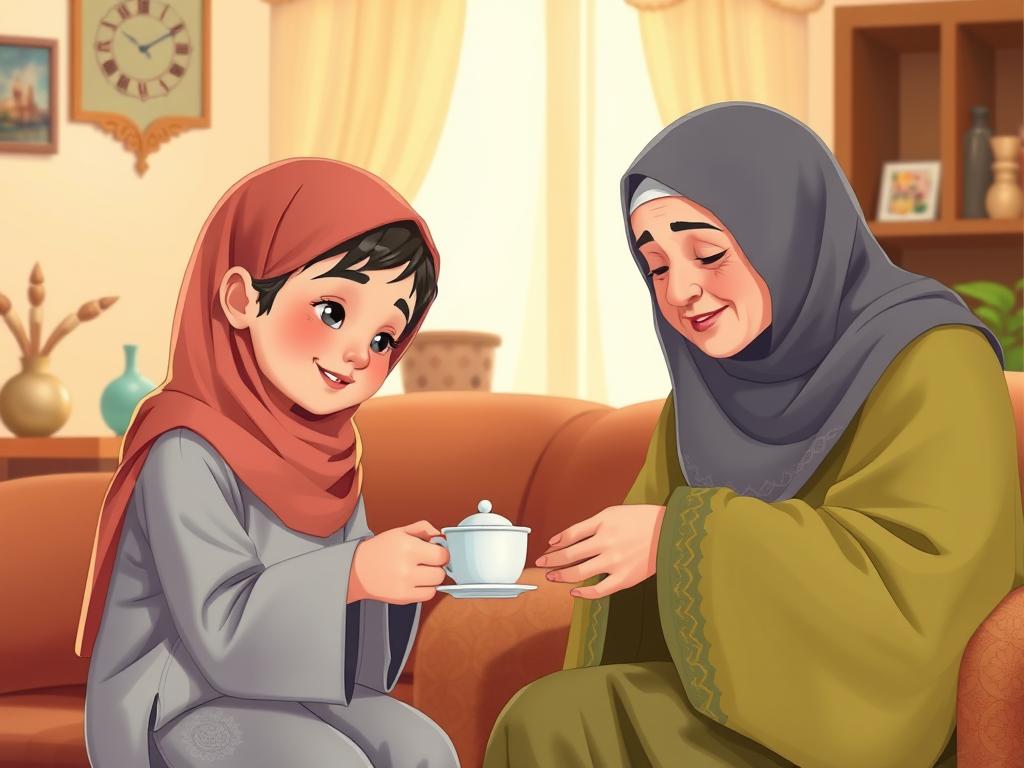
Prophet Muhammad ﷺ placed great emphasis on respecting and honoring parents. This Hadith highlights the special status of mothers in Islam.
عَنْ أَبِي هُرَيْرَةَ رَضِيَ اللَّهُ عَنْهُ قَالَ: جَاءَ رَجُلٌ إِلَى رَسُولِ اللَّهِ صَلَّى اللَّهُ عَلَيْهِ وَسَلَّمَ فَقَالَ: يَا رَسُولَ اللَّهِ مَنْ أَحَقُّ النَّاسِ بِحُسْنِ صَحَابَتِي؟ قَالَ: أُمُّكَ قَالَ: ثُمَّ مَنْ؟ قَالَ: ثُمَّ أُمُّكَ قَالَ: ثُمَّ مَنْ؟ قَالَ: ثُمَّ أُمُّكَ قَالَ: ثُمَّ مَنْ؟ قَالَ: ثُمَّ أَبُوكَ
‘An Abi Hurairata radiya Allahu ‘anhu qala: Ja’a rajulun ‘ila Rasuli Allahi salla Allahu ‘alayhi wasallama faqala: Ya Rasula Allahi man ahaqqu an-nasi bihusni sahabati? Qala: Ummuka. Qala: Thumma man? Qala: Thumma ummuka. Qala: Thumma man? Qala: Thumma ummuka. Qala: Thumma man? Qala: Thumma abuka.
Abu Huraira reported that a man came to the Messenger of Allah ﷺ and said, “O Messenger of Allah, who is most deserving of my good companionship?” He said, “Your mother.” The man asked, “Then who?” He said, “Your mother.” The man asked again, “Then who?” He said, “Your mother.” The man asked once more, “Then who?” He said, “Then your father.”
This Hadith teaches children the special status of parents, particularly mothers, in Islam. It shows that respecting, honoring, and caring for parents, especially mothers, is among the most important duties of a Muslim. The repetition of “your mother” three times before mentioning the father emphasizes the extraordinary respect and care that mothers deserve for their sacrifices and nurturing.
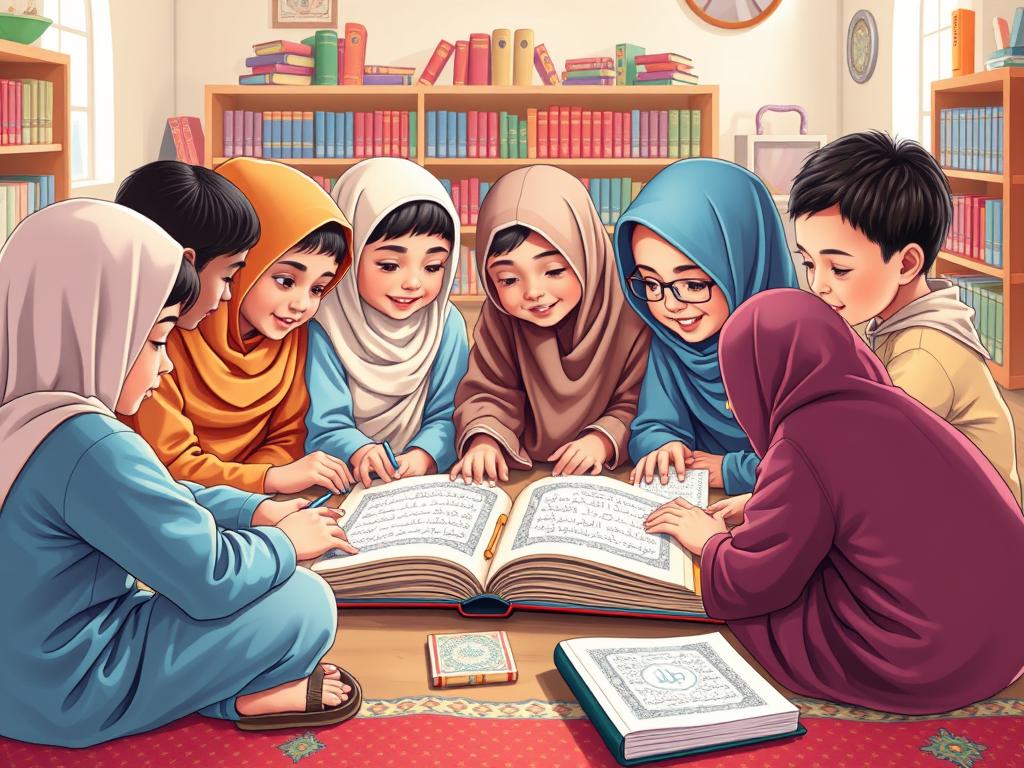
Prophet Muhammad ﷺ greatly valued education and encouraged Muslims to seek knowledge throughout their lives. This Hadith highlights the importance of learning and the special status of those who pursue knowledge.
عَنْ أَبِي الدَّرْدَاءِ رَضِيَ اللَّهُ عَنْهُ قَالَ: سَمِعْتُ رَسُولَ اللَّهِ صَلَّى اللَّهُ عَلَيْهِ وَسَلَّمَ يَقُولُ: مَنْ سَلَكَ طَرِيقًا يَلْتَمِسُ فِيهِ عِلْمًا سَهَّلَ اللَّهُ لَهُ طَرِيقًا إِلَى الْجَنَّةِ وَإِنَّ الْمَلَائِكَةَ لَتَضَعُ أَجْنِحَتَهَا رِضًا لِطَالِبِ الْعِلْمِ وَإِنَّ الْعَالِمَ لَيَسْتَغْفِرُ لَهُ مَنْ فِي السَّمَاوَاتِ وَمَنْ فِي الْأَرْضِ حَتَّى الْحِيتَانُ فِي الْمَاءِ
‘An Abi ad-Darda’i radiya Allahu ‘anhu qala: Sami’tu Rasula Allahi salla Allahu ‘alayhi wasallama yaqulu: Man salaka tariqan yaltamisu fihi ‘ilman sahhala Allahu lahu tariqan ‘ila al-jannati wa’inna al-mala’ikata latada’u ajnihataha ridan litalibi al-‘ilmi wa’inna al-‘alima layastaghfiru lahu man fi as-samawati waman fi al-ardi hatta al-hitani fi al-ma’i.
Abu al-Darda reported that he heard the Messenger of Allah ﷺ say: “Whoever travels a path in search of knowledge, Allah will make easy for him a path to Paradise. The angels lower their wings in approval of the seeker of knowledge, and everyone in the heavens and earth seeks forgiveness for the knowledgeable person, even the fish in the water.”
This Hadith teaches children the immense value of education and seeking knowledge in Islam. It shows that learning is not just important for worldly success but is also a spiritual journey that brings one closer to Paradise. The beautiful imagery of angels lowering their wings and all creation seeking forgiveness for the knowledge-seeker highlights the special status of those who dedicate themselves to learning.
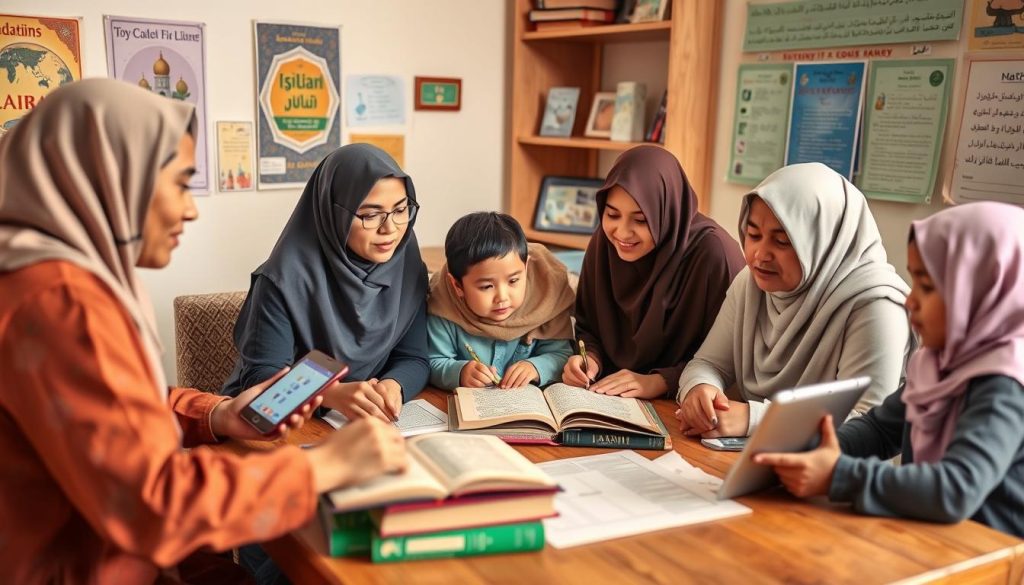
Hadith stories offer powerful tools for character building and moral education. Here are some tips for parents and educators on how to effectively use these narratives with children:
| Age Group | Storytelling Approach | Focus Areas | Recommended Activities |
| 3-5 years | Very simple, concrete stories with clear messages | Basic concepts like kindness, sharing, and listening | Coloring pages, simple crafts, puppet shows |
| 6-8 years | More detailed stories with simple moral lessons | Honesty, respect for parents, kindness to animals | Role-play, drawing scenes from stories, simple writing activities |
| 9-12 years | Complete stories with context and deeper discussions | Character development, responsibility, empathy | Journaling, group discussions, community service projects |
The Hadith stories of Prophet Muhammad ﷺ offer timeless wisdom that can help shape children’s character and moral compass. By sharing these narratives in age-appropriate ways and connecting them to everyday experiences, parents and educators can instill Islamic values that will guide children throughout their lives.
Remember that the most effective teaching comes not just from telling these stories but from embodying their lessons in our own actions. When children see adults practicing the values of kindness, honesty, respect, and compassion, they learn that these principles are not just stories but a way of life.
May these Hadith stories inspire the next generation to follow the beautiful example of Prophet Muhammad ﷺ and grow into compassionate, principled individuals who contribute positively to their families, communities, and the world.
Continue the learning journey with our printable activity pack featuring coloring pages, discussion cards, and interactive worksheets based on these 10 Hadith stories. Perfect for parents, teachers, and Islamic school educators.


